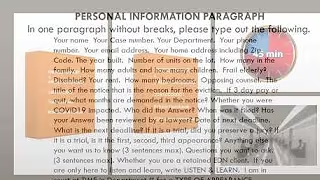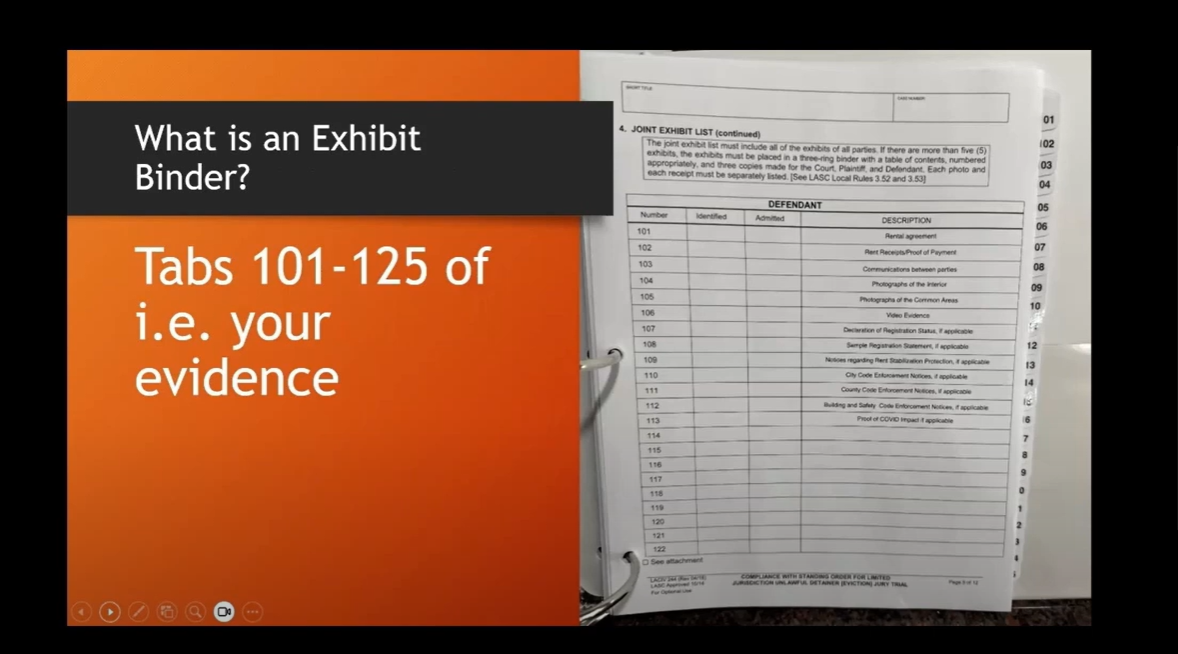Overview Summary:
This course prepares tenants for their first court appearance in an eviction case, emphasizing the importance of preparation, knowing your rights, and understanding the negotiation process. It advises tenants on how to present themselves, interact with opposing counsel, and respond to pressure from the judge. The goal is to empower tenants to navigate the legal process confidently and work towards a favorable outcome, such as a move-out agreement with rent forgiveness or a payment plan to stay in their home.
Actionable Steps for the Tenant:
- Preparation Before Court:
- Watch all EDN videos in order, attend webinars and empowerment classes, and join a tenant support group.
- Keep a journal to document important details of your case.
- Familiarize yourself with settlement possibilities and the 16 factors to consider for your case.
- Visit your courtroom to observe a session.
- Prepare an exhibit notebook and a trial notebook.
- If you want to move out, fill out the stipulation for judgment form with your ideal offer and blank copies for negotiation.
- If you want to stay, fill out the settlement agreement form with your ideal offer and blank copies for negotiation.
- Verify your jury demand and fee waiver.
- Prepare and memorize key phrases and speeches for negotiations and interactions with court staff.
- What to Do On the Day:
- Get up early, have breakfast, and dress neatly in business casual attire.
- Text your updated PIP (Personal Information Profile) to the EDN staff.
- Arrive at court 45 minutes early with your notebooks.
- Locate your case number on the docket outside the courtroom.
- Check in with the bailiff or clerk, providing your docket number and name.
- If a commissioner is present, know which ones to stipulate to and which to refuse.
- Negotiation and Communication:
- If you have an offer to make, approach the plaintiff’s counsel.
- Clearly state your name, case number, docket number, and desired outcome (move out or pay and stay agreement).
- Clearly state your ideal offer and be prepared to negotiate, but also know your bottom line.
- If negotiations are not progressing, request a mandatory settlement conference.
- Introduce yourself to the EDN attorney if one is present.
- Be wary of opposing counsel’s initial friendly approach, and don’t be bullied into a bad deal.
- If pressured, use your “late night FM DJ voice” and reiterate your desire for a mandatory settlement conference.
- If asked about EDN representation, clarify that you are a Tenant Empowerment Program student.
- If No Agreement is Reached:
- Get new court dates and clarify what type of appearance it is (mandatory settlement conference, trial setting conference, or final status conference).
- Thank the bench officer.
- If the judge pressures you, remain firm and reiterate your position.
- If the judge makes changes to the agreement, object and ask for time to consult with EDN.
- Understanding the Courtroom:
- Familiarize yourself with the layout of the courtroom, including the bench, bar, well, jury box, and counsel tables.
- Understand the roles of the bailiff, clerk, and judge.
- Maintaining Composure and Focus:
- Keep calm and watch your tone.
- Listen carefully to questions and answer only what is asked.
- Rely on your training and the support of the EDN.
Conclusion:
The first day in court is a critical step in the eviction process. By thoroughly preparing, understanding your rights, and remaining calm and assertive, you can navigate this challenging situation and work towards a positive resolution. The EDN’s Tenant Empowerment Program offers the knowledge, skills, and support needed to be successful in court, but it is essential to follow their instructions and actively participate in the program.
Curriculum
- 1 Section
- 7 Lessons
- Lifetime


